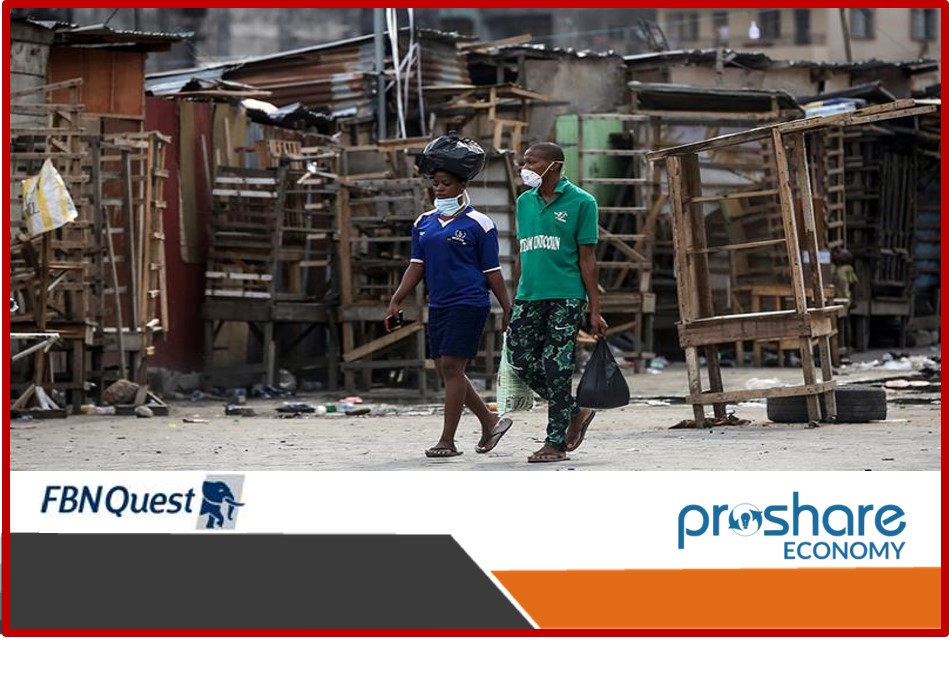Monday, June 08, 2020 / 05:43PM / by FBNQuest Research / Header Image Credit: Al Jazeera
Weare indebted to the National Bureau of Statistics (NBS) for its recent poll toassess the impact of COVID-19 on the population. The bureau's telephonecoverage of the same 1,950 households it contacted in 2018/19 within itsgeneral household survey does not make pleasant reading. It held between 20April and 11 May, and therefore covers the period of the FGN lockdown. Afollow-up after another three months may give an idea of the extent to whichthe damage has been made good. The World Bank gave its support on the technicalside and will, we hope, back a repeat survey.
Onemployment, the survey found that 42 per cent of respondents had been workingbefore the outbreak but had since lost their jobs. Interestingly, there werenot huge differences per income group, with the ratio 45 per cent for thepoorest quartile and 39 per cent for the richest quartile.
Interms of sectors, the hit was greatest in commerce, services and agriculture.Services and retail are particularly vulnerable to a lockdown: we need look nofurther than the impact on restaurants, bars, family celebrations, culturalevents and shopping. When we read across to FBNQuest's manufacturing PMI forMay, we find that the reading for the workforce was below neutral in commonwith all sub-indices - but did not crash.
Thehit from COVID -19, not forgetting the related collapse of the crude oil priceat the time, has highlighted the fragility of household finances and the verymodest safety net for the population. The most interesting chart in thebureau's note in our view, covers coping mechanisms for shocks. It shows that51 per cent of respondents reduced their consumption of food and 29 per centdrew on savings. The next three mechanisms were cuts in non-food consumption,support from friends and family, and additional income-generating activities(We would have expected households to cut non-food before food consumption).
Inadvanced economies, the mechanisms would include one-off support from the statesuch as a furlough scheme and regular government benefits to cover unemploymentand housing. Common to developing and advanced economies are food banks ortheir equivalent.
Anextended lockdown is an indulgence that only advanced economies can affordbecause they can shield the majority with fiscal resources. The Japanesepackage of measures to date has been estimated at close to 20 per cent of GDP.Germany has now shown the way forward with a second set of policies tostimulate the domestic economy post- COVID. Most advanced economies will beunable to match the combination of tax cuts and spending increases, estimatedat 4 per cent of GDP. At this point, analysts can create sub-categories ofhealthy and stretched public finances in advanced economies.
Oneducation, the bureau finds that 81 per cent of households had no contact withtheir children's teachers during lockdown. The ratio is worst for the poorestquartile, and so tallies with evidence from advanced economies that children inpoor families are the losers from lockdown because for whatever reason they benefitthe least from e-teaching.
Finally,in terms of the shocks themselves we learn that the No 1 was increases in theprice of major food items. This was reported by 85 per cent of respondents. Theinflation data show food m/m price increases in March and April that weresteady but far from spectacular. Possibly the May report from the NBS will givea different story.
Related Articles - FBNQuest
- The Virus and Post-Virus Hit to All Airlines - FBNQuest
- Big Oil, Little Oil Have Full Lives Ahead - FBNQuest
- An African Perspective on the impact of COVID-19 and the Response to it - FBNQuest
- Viral Setback to Global Thinking - FBNQuest
- Apples in Ghana, Pears in Nigeria - FBNQuest
- The Potential of Technology to Reduce Human Error - FBNQuest
- Pick and Mix in Nigeria's Response to the COVID-19 Virus - FBNQuest
Related News
- Implications of Nigeria's Consumption Expenditure Pattern
- Teslim Shitta-bey To Speak On Coronanomics Report Tomorrow On WebTV
- NOVA Monthly Economic Insight: Foreign Borrowings Offer Temporary Reprieve
- NBS Publishes COVID-19 Impact Monitoring Survey Report for May 2020
- Lockdown Fatigue and Anxiety: A Potent Mix for Social Unrest - LBS EBS - June 2020
- Inflationary Pressure, Weakening Pockets
- FAAC Disburses N780.93bn in April 2020 - NBS
- PMI: Broad Based Slowdown Reflects the Impact of COVID-19 Restrictions
- PMI Reading No 86: A New Low for the Headline
- Innovative Economic Solutions to Unlock Mass Prosperity
- Coronation Merchant Bank Organizes Forum to discuss the Impact of COVID-19 and declining Oil Prices
- FAAC Disburses N581.57bn in March 2020 - NBS
 Lagos, NG • GMT +1
Lagos, NG • GMT +1











 1094 views
1094 views










 Sponsored Ad
Sponsored Ad
 Advertise with Us
Advertise with Us









